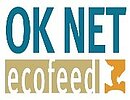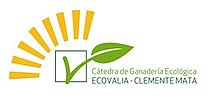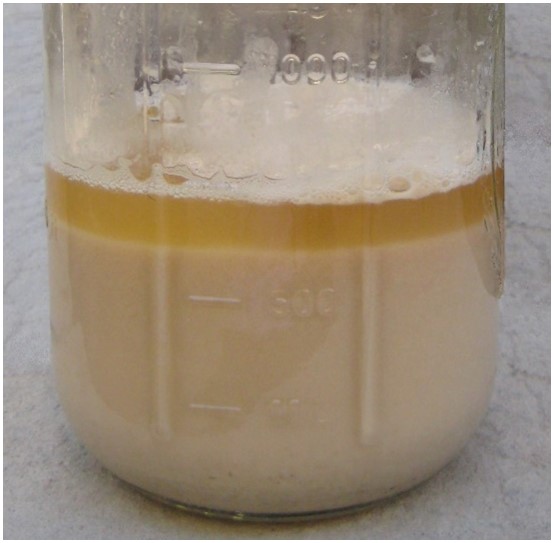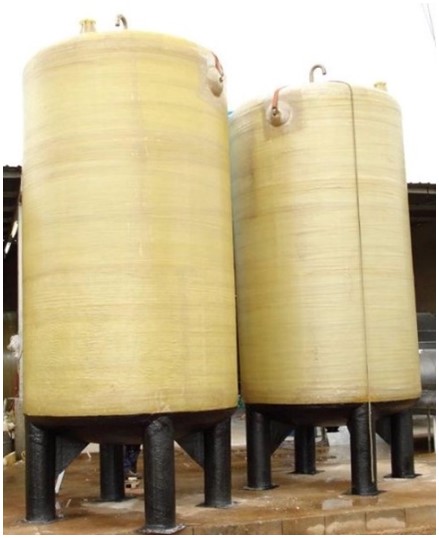Brewer’s yeast for organic pigs
Problem
Protein supply is a constant challenge for organic farming. Organic raw materials with high protein content are quite scarce in some regions. The search for alternative sources of protein leads to the evaluation of the organic industry by-products.
Solution
Brewer’s yeast is a by-product of beer in brewing industries. It is considered a liquid by-product (figure 1) with approximately 15% dry matter (DM). It is obtained from the anaerobic fermentation of beer, formed, among other ingredients, by Saccharomyces cerevisiae. Brewer’s yeast has a high content of protein and vitamins of the B complex, which compensates the high transport costs due to its high water content.
Benefits
- Yeast has a high content of protein (> 47% DM) of high biological (3.6% of lysine) and digestible value (> 85%), thus reducing the cost of feed.
- Yeast is rich in B vitamins, especially biotin and folic acid (besides vitamin B1, B2, B6, B12, PP, B5) and in vitamin D, with a content of 2000 - 5000 IU (International Unit)/g DM.
- The content of phosphorus in the yeast is up to 0.8-1.3%.
- Yeast promotes animal performance and health.
- Yeast improves the quality of the carcass.
Applicability box
Geographical coverage
Farms close to an organic brewery.
Application time
All year, although it is more available in spring and summer.
Required time
None; but no more than two days of storage.
Period of impact
None.
Equipment
Special equipment is needed, including an automat-ic system for liquid feeding and two storage tanks (figure 2) so that they can be cleaned between batches.
Best in
Sows, growers and fattening pigs.
Practical Recommendations
- Two holding tanks are needed for hygiene reasons.
- Yeast deteriorates very easily, do not use the product stored over 2 days.
- It is necessary to deactivate (kill) the yeast before transporting and using it on the farm. Hence, autolyzed yeast should be used.
- Yeast is a quite seasonal product, and it cannot be stored; however, it can be added to silage mixtures as an alternative to avoid its deterioration.
Further information
Video- The video “Liquid Feed for pigs” is available from Lallemand Animal Nutrition. The video shows how liquid feed systems work.
Reading
- Broadway, P.R., Carroll, J.A. and Burdick Sanchez, N.C. (2015). Live Yeast and Yeast Cell Wall Supplements Enhance Immune Function and Performance in Food-Producing Livestock: A Review. Microorganisms, Vol 3 (3), pp. 417-427.
- De Blas, C., Mateos, G.G. and Rebollar, P.G. (2010). Levadura de cerveza. In: Tablas FEDNA de composición y valor nutritivo de los alimentos para la fabricación de piensos compuestos (3ª ed.) Fundación Española para el Desarrollo de la Nutrición Animal. Madrid. 502 pp.
- Heuzé, V., Thiollet, H., Tran, G., Edouard, N., Lessire, M., Lebas, F. (2018). Brewers yeast. Feedipedia, a programme by INRA, CIRAD, AFZ and FAO.
- Further documents can be found on the Organic Farm Knowledge website.
About this practice abstract and OK-Net EcoFeed
Publishers:Asociación Valor Ecológico – Ecovalia,
ES41013Sevilla,
Phone ,
info@ecovalia.org,
www.ecovalia.orgUniversidad de Córdoba, Campus Universitario de Rabanales, Departa-mento de Producción Animal, Facultad de Veterinaria,
ES14071Córdoba,
Phone ,
,
www.uco.esResearch Institute of Organic Agriculture (FiBL),
CH5070Frick,
Phone +41 62 865 72 72,
info.suisse@fibl.org,
www.fibl.orgIFOAM Organics Europe,
BE1000Brussels,
Phone +32 2 280 12 23,
www.organicseurope.bio,
www.organicseurope.bio
Review: Lindsay Whistance, Organic Research Centre, UK, Lauren Dietemann, FiBL Switzerland, Helga Willer, FiBL Switzerland
Contact: vrestevez@uco.es
Permalink: https://organic-farmknowledge.org/tool/38116
https://orgprints.org/view/projects/OKNetEcoFeed.html
This practice abstract was elaborated in the Organic Knowledge Network on Monogastric Animal Feed project. The project is running from January 2018 to December 2020. The overall aim of OKNet EcoFeed is to help farmers, breeders and the organic feed processing industry in achieving the goal of 100% use of organic and regional feed for monogastrics.
Project website: https://ok-net-ecofeed.eu/
IFOAM Organics Europe (project coordinator), BE; Aarhus University (ICROFS), DK; Organic Research Centre (ORC), UK; Institut Technique de l'Agriculture Biologique (ITAB), FR; Research Institute of Organic Agriculture (FiBL), CH; Bioland, DE; Associazione Italiana perl'Agricoltura Biologica (AIAB), IT; Donau Soja DS, AT; Swedish University of Agricultural Sciences, SE; ECOVALIA, ES; Soil Association, UK.




This project has received funding from the European Union’s Horizon 2020 research and innovation programme under grant agreement No 773911. This communication only reflects the author’s view. The Research Executive Agency is not responsible for any use that may be made of the information provided. The authors and editors do not assume responsibility or liability for any possible factual inaccuracies or damage resulting from the application of the recommendations in this practice abstract

